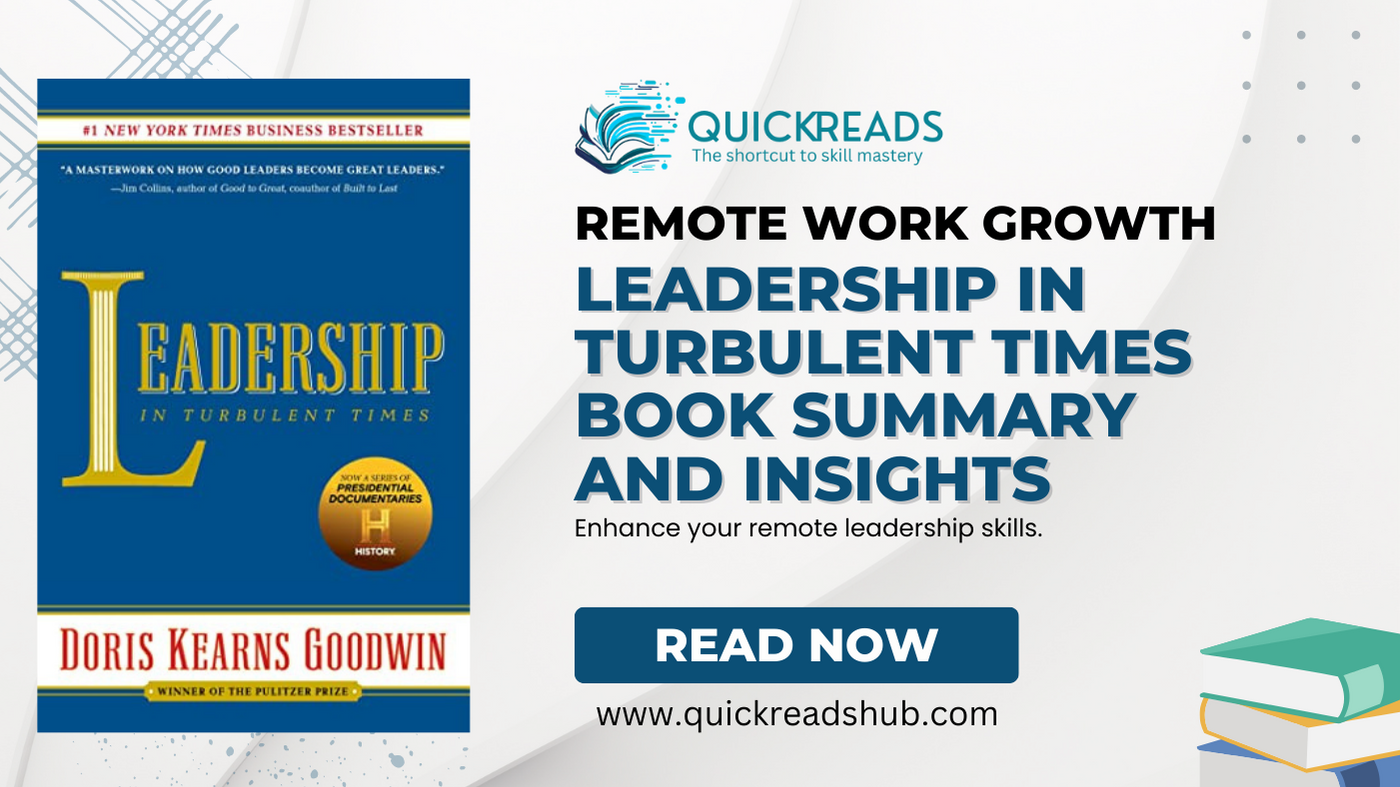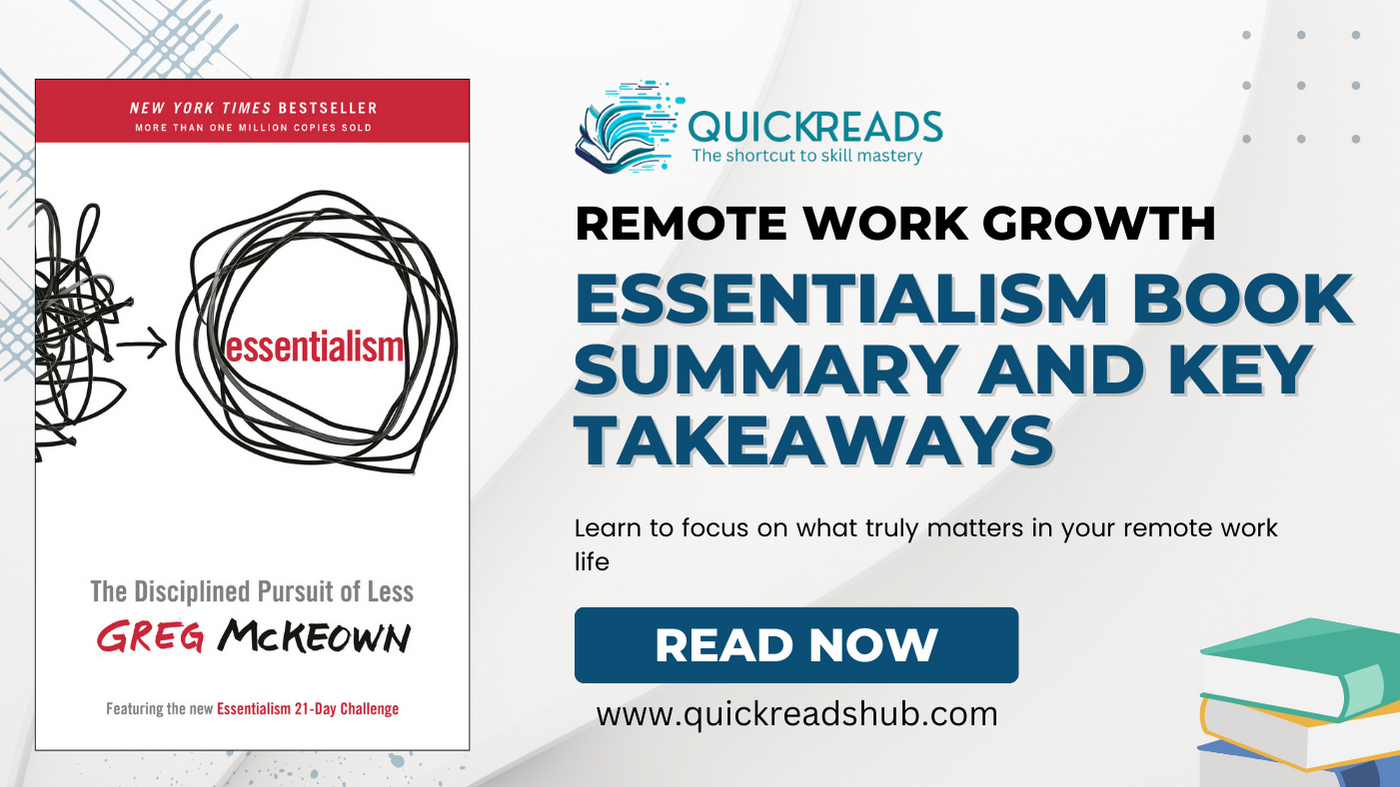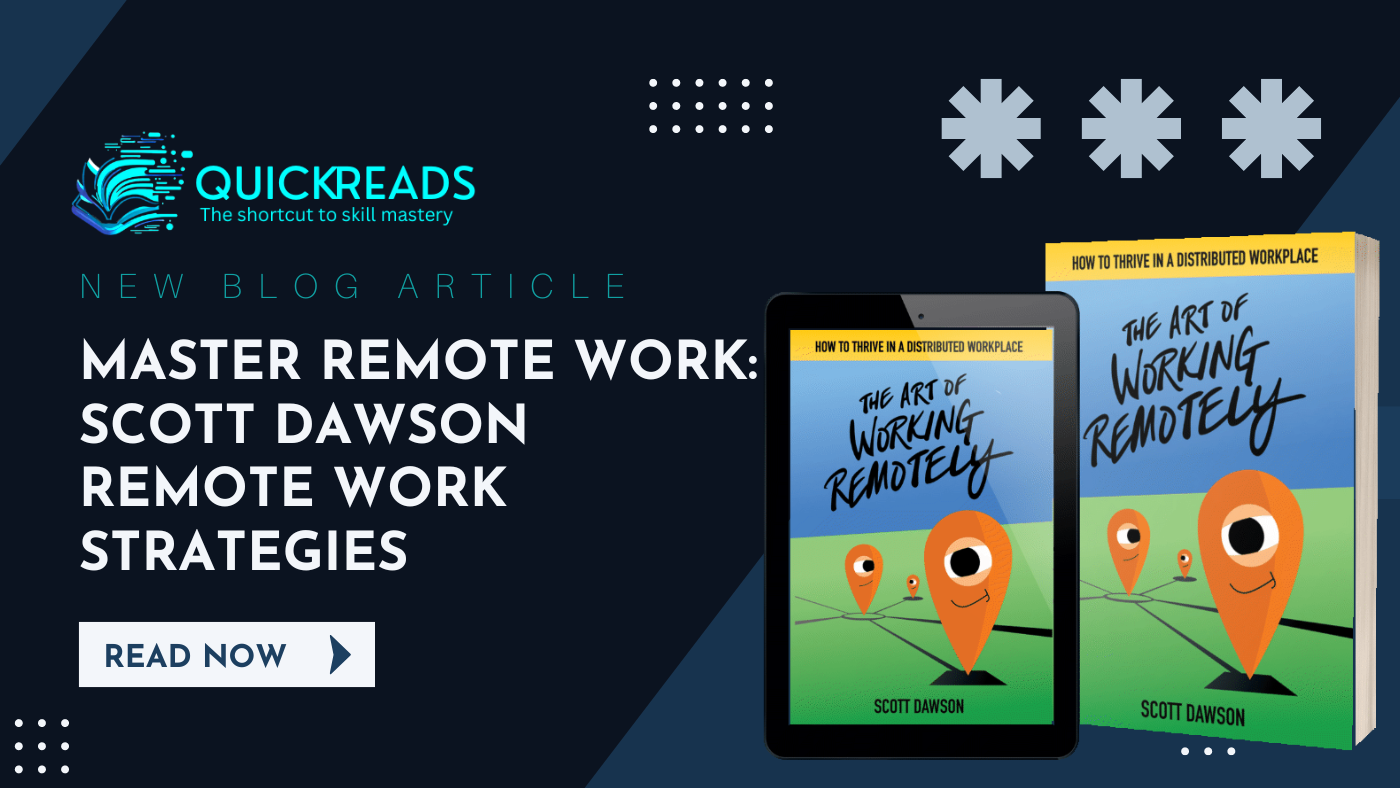I. Introduction
In an era characterized by constant digital distractions, the ability to focus deeply on the tasks at hand is increasingly rare. Yet, it is precisely this deep, concentrated work that fosters unprecedented productivity and success. Enter Cal Newport, a notable author, and professor of computer science, who introduced the concept of “Deep Work” to the world. This blog offers a comprehensive “Deep Work Book Summary“, dissecting Newport’s crucial insights and practical applications for enhancing productivity.
Newport’s insightful wisdom, a combination of academic knowledge and personal experiences, has painted a compelling picture of how successful work patterns can be cultivated. He has extensively explored how the battle against digital distractions can be won, leading to a more focused and satisfying work life.
In this blog post, you will be taken on a journey through the principles of deep work. You will discover how these principles can be implemented, particularly for remote workers and digital nomads in the present fast-paced digital age. You can anticipate gaining a solid understanding of how deep work can revolutionize your productivity, and ultimately, your satisfaction with work and life.
Additionally, expect valuable tips for carving out your deep work regimen, potential hurdles you might encounter, and practical solutions to overcome them. By the end of this Deep Work Book Summary, you’ll have a set of actionable strategies that you can apply to your work routine. The intention here is not just to inform, but to empower you to transform the way you work, enabling a more focused, efficient, and fulfilling work experience.
II. Unpacking the Concept of Deep Work
An Essential Skill in Our Digital Age
Deep work refers to the ability to focus intensely on a cognitively demanding task without distractions. It requires full immersion in what you are doing, ultimately leading to greater productivity and a higher quality of work. Deep work is akin to delving into a mental state where creativity flourishes, and you get more done in less time.
In our present era, marked by digital distractions and an onslaught of information, it is easy to fall into patterns of shallow work. Shallow work encompasses tasks that require minimal cognitive effort and are often performed while distracted. These tasks, such as checking emails or scrolling through social media, may give an illusion of productivity but often contribute little value.
Why is Deep Work Vital?
In a world where our attention is continually pulled in different directions, the capacity to do deep work is not just beneficial – it is vital. With the ability to perform deep work, you can learn quickly, produce at a high-quality level, and achieve your goals faster.
Moreover, as automation and artificial intelligence continue to progress, the skills developed through deep work—complex problem-solving, critical thinking, and creativity—are becoming more valuable. Those who master deep work can thrive in this digital age, maintaining their competitive edge in a fast-paced and constantly changing work landscape.
By understanding and practicing deep work, you set the stage for enhanced productivity, satisfaction, and success in your career and beyond. The subsequent sections of this Deep Work Book Summary will further delve into the nuances of this transformative concept, its practical applications, and how you can successfully incorporate it into your work habits.
III. Deep Work Book Summary
Part 1: The Idea of Deep Work
At the core of Newport’s philosophy is the concept of deep work. This idea is underpinned by the belief that the ability to focus without distraction on a cognitively demanding task is a valuable skill in our increasingly digital and interconnected world. Deep work allows you to quickly master complicated information and produce better results in less time.
However, embracing deep work is not merely about productivity. It also concerns personal satisfaction and the sense of fulfillment derived from dedicating oneself completely to a task. Newport suggests that the state of flow associated with deep work can contribute significantly to personal well-being.
In the context of remote work, the concept of deep work becomes even more critical. With potential distractions of home environments and digital communications, remote workers must strive to cultivate this ability to fully immerse themselves in work tasks.
Part 2: The Rules of Deep Work
Newport proposes four main rules or strategies to cultivate a deep work habit.
- Work Deeply: You must decide on your depth philosophy and stick to it. This could involve blocking out time for deep work and reducing the potential for distractions.
- Embrace Boredom: Instead of giving in to distractions at the slightest hint of boredom, you should train yourself to handle and even embrace it. This tactic helps your mind to stay focused for extended periods.
- Quit Social Media: Minimizing the use of attention-stealing platforms like social media is crucial for maintaining focus and promoting deep work.
- Drain the Shallows: This rule involves minimizing shallow work—tasks that do not contribute much to your work or personal goals.
The practicality of these rules shines in remote work situations. Remote workers often face unique challenges, including managing distractions at home and balancing work and personal life. By adhering to Newport’s rules, you can develop an effective deep work routine, leading to greater productivity and satisfaction.
With this understanding of the deep work concept and rules, the upcoming sections will explore how you can apply these principles to your remote work routine and some key takeaways from the Deep Work Book Summary. Stay tuned.
IV. Key Takeaways from the Deep Work Book Summary
As we delve deeper into the “Deep Work” book summary, it is essential to highlight a few key takeaways that can greatly influence your productivity and satisfaction, particularly in a remote work setting.
The Importance and Benefits of Deep Work
The primary benefit of deep work is the ability to produce high-quality work in less time. But beyond this, deep work fosters a sense of fulfillment. It allows you to engage fully with your tasks, giving your work a purpose beyond the mere completion of tasks.
As a remote worker, I have personally experienced the advantages of deep work. There was a time when I had a demanding project that required intensive research and meticulous attention to detail. Embracing deep work allowed me to complete the task efficiently, leading to high praise from my client and a sense of accomplishment for me. It demonstrated the power of deep work in creating value in the work I do.
Strategies to Cultivate a Deep Work Habit
Adopting a deep work mindset is not an overnight process. It requires persistence and discipline. One effective strategy is to dedicate specific time blocks for deep work while ensuring that your environment is free from distractions. Another approach is to consciously embrace periods of boredom, which is essential to strengthening your ability to concentrate.
In my experience as a remote worker, implementing these strategies can sometimes be challenging. Yet, the effort is well worth it. For instance, setting aside distraction-free periods in my day for deep work has not only boosted my productivity but also allowed me to enjoy my leisure time without the nagging guilt of unfinished work.
Balancing Deep and Shallow Work in Your Life
While deep work is essential, it is equally vital to balance it with shallow work. Shallow work includes tasks like answering emails or attending less critical meetings, tasks that, while necessary, do not require intense concentration.
In my remote work routine, I’ve learned to manage this balance by dedicating specific times of the day to shallow work. Mornings are reserved for deep work when my mind is freshest, while afternoons are for shallow tasks. This routine ensures that I give adequate attention to all aspects of my work without compromising my deep work sessions.
The journey to mastering deep work is a process, a rewarding one that can transform your work and personal life. As we move forward, we will explore Cal Newport‘s unique insights into how to achieve focused success in a distracted world, especially as a remote worker. Stay tuned.
V. Cal Newport Deep Work Insights
Delving further into the wisdom offered in “Deep Work,” we uncover Cal Newport‘s unique insights on achieving focused success in a world riddled with distractions.
Embracing Boredom
Newport highlights the importance of tolerating boredom. Contrary to what one might expect, he argues that enduring periods of boredom helps cultivate our capacity to engage in deep work. This notion can be transformative, particularly for digital nomads and remote workers.
Let me share an example from my own experience. There was a time when I had to wait for large files to download, a task that could be quite boring. Initially, I would use these moments to check emails or browse social media. However, after understanding Newport’s insight, I simply waited, allowing the wave of boredom to pass. Over time, this practice significantly enhanced my ability to concentrate on demanding tasks.
Quit Social Media
Newport boldly suggests considering a social media detox. His reasoning? Social media is often a prime source of distraction, inhibiting our ability to engage in deep work. If you’re a digital nomad or a remote worker whose productivity is powered by self-motivation and focus, this idea could be transformative.
Let me be candid. It’s not realistic to quit social media entirely, but a restriction during work hours can make a world of difference. Since adopting a “no social media during work hours” rule, I noticed a remarkable uptick in focus and productivity.
Schedule Every Minute of Your Day
Newport emphasizes the value of meticulous planning, suggesting that scheduling each minute of your day can limit time spent on non-productive activities. From my own practice, this approach has helped set clear boundaries between my work and personal life, reducing stress and enhancing work-life balance.
Having implemented this principle, I began planning my workdays in minute detail, specifying time slots for deep work, shallow work, breaks, and personal time. This method curtailed wasted time and helped me derive more satisfaction from both my work and personal activities.
While they may seem simple, these insights can have a profound impact on our productivity and satisfaction as remote workers. They emphasize the need for an environment conducive to deep work and the significance of being intentional about how we use our time. In the upcoming section, we’ll delve into the practical application of these principles in a remote work setup.
VI. Practical Applications of Deep Work for Remote Workers
Embracing the principles of Deep Work can truly redefine your remote work experience. Here’s how you can go about it:
Define Your Deep Work Hours
One of the first steps to harness the power of Deep Work is to establish designated Deep Work hours. During these hours, commit to focusing intensely on a single task, free of distractions. For me, I found the early morning hours, before the world awakens, to be my most productive for Deep Work.
Use a Signal to Indicate Deep Work Time
Create a specific signal to mark your Deep Work hours. This could be as simple as closing the door to your workspace or putting on a pair of headphones. My signal is a “Do Not Disturb” sign that I hang on my home office door, informing my family that I’m in my Deep Work phase.
Creating an Ideal Environment for Deep Work
While every individual’s perfect Deep Work environment will vary, here are a few suggestions based on my experience:
Eliminate Distractions
An environment conducive to Deep Work is one devoid of interruptions. This could mean turning off phone notifications or using noise-canceling headphones to drown out ambient noise. I use a white noise app to maintain focus during my Deep Work sessions.
Set Physical Boundaries
Just as you would in an office setting, it’s essential to create a specific, clutter-free space in your home where you perform your Deep Work. In my case, I’ve dedicated a quiet corner of my home to Deep Work, equipped with all the tools I need for my tasks.
Break Time is Crucial
Integrating breaks into your Deep Work routine can keep your mind refreshed and prevent burnout. I make it a point to take a brief walk or practice some light stretches during my Deep Work breaks.
Case Study: Successful Implementation of Deep Work
When I first transitioned to remote work, managing distractions was challenging. But once I started applying Cal Newport‘s Deep Work principles, my productivity soared. I was able to complete tasks faster and with greater quality, leading to increased satisfaction with my work.
Embracing Deep Work has been a game-changer in my remote work experience. It has not only boosted my productivity but also improved my work-life balance. In the next section, we’ll address potential challenges you might face when implementing Deep Work and how to overcome them.
VII. Addressing Challenges in Implementing Deep Work
While the principles of Deep Work offer immense benefits, it’s normal to encounter hurdles while integrating them into your work routine. Here are common challenges and strategies to address them:
Challenge 1: Distractions
In the remote work environment, distractions abound, whether they’re household chores or social media notifications. Overcoming them requires conscious effort and planning.
Solution: Build a designated workspace and schedule dedicated Deep Work hours during your most productive times. Use tools like website blockers or productivity apps to keep digital distractions at bay. My solution involved setting up a home office and using a noise-canceling headset to filter out environmental noise.
Challenge 2: Blurred Work-Life Boundaries
Working remotely can blur the line between work and personal time, making it difficult to disconnect and hampering Deep Work.
Solution: Strictly demarcate your work hours and personal time. After your set work hours, shut down your work devices and engage in relaxing activities. Personally, setting a clear work schedule and adhering to it helped me maintain a healthy work-life balance.
Challenge 3: Sustaining Concentration
Maintaining focus for extended periods during Deep Work can be challenging, especially when you’re new to it.
Solution: Start with shorter Deep Work sessions and gradually increase their length as your concentration improves. Regular breaks during these sessions can also help rejuvenate your mind. I found that starting with 30-minute sessions and gradually extending them worked well for me.
Challenge 4: Isolation
Deep Work often requires solitude, which might feel isolating, especially in a remote work setup.
Solution: Balance your Deep Work periods with collaboration and social interaction. Schedule virtual coffee breaks or team chats after Deep Work sessions. In my experience, staying connected with colleagues through regular virtual meetups helped mitigate feelings of isolation.
In conclusion, practicing Deep Work may present challenges, but with the right strategies, you can overcome them and reap their benefits. In the next section, we’ll wrap up with a recap of the Deep Work summary and insights from Cal Newport.
VIII. Conclusion: The Power of Deep Work
This exploration of the “Deep Work” concept, derived from Cal Newport‘s insightful book, has taken us through a journey of understanding how we can enhance our productivity, especially in a remote work setup.
Deep Work, as we’ve learned, refers to the ability to focus without distraction on cognitively demanding tasks. This approach enables you to produce better results in less time and is particularly relevant in today’s fast-paced, distraction-filled world.
We’ve delved into the two components of the book: the idea and the rules of Deep Work. These components help us grasp the benefits of Deep Work and provide a roadmap to incorporating it into our work lives.
Key takeaways from our Deep Work Book Summary include the significance of this work style and the strategies to foster it, such as creating rituals, embracing boredom, and quitting social media. Balancing Deep Work and shallow work is also crucial for a well-rounded work life.
Our exploration of Cal Newport‘s Deep Work insights has offered a fresh perspective on achieving focused success in a distracted world. We have seen how these principles apply to digital nomads and remote workers, contributing to productivity and job satisfaction.
We also discussed the practical application of Deep Work principles in a remote work setting and how to create an ideal environment for such focused work. Addressing challenges such as distractions, blurred work-life boundaries, sustaining concentration, and feelings of isolation were also highlighted.
As someone who has adopted these principles, I can attest to the transformation Deep Work can bring to your professional and personal life. It may require an initial period of adjustment, but the results – heightened focus, improved productivity, and a greater sense of satisfaction in your work – make it worth it.
I encourage you, dear readers, to explore Deep Work and consider integrating its principles into your work routines. In the final section, we will encourage further interaction and provide actionable steps for you to take on this journey.
Embrace the Power of Deep Work
Now that we’ve traversed the concepts, benefits, and applications of Deep Work, it’s time for you to dive in and experience its transformative power. Whether you’re a digital nomad, remote worker, or someone simply striving for productivity, adopting Deep Work principles could be your game-changer.
To begin, let’s embark on a journey of “Deep Work 101″ with actionable steps to guide you:
- Identify Your Deep Tasks: Start by defining which tasks in your daily work demand deep, undisturbed focus. It could be anything from project planning, writing, coding, or designing.
- Schedule Deep Work: Block out specific times in your day or week for Deep Work. This time should be non-negotiable, free from distractions, and dedicated solely to your identified deep tasks.
- Establish Rituals: Create rituals to ease into your Deep Work state. It could be a clean workspace, a cup of coffee, or a few minutes of meditation before you start.
- Embrace Boredom: Train your mind to be comfortable with boredom. This practice helps improve your focus and makes it easier to resist distractions when performing Deep Work.
- Disconnect: Take deliberate breaks from technology. Regular digital detoxes can prevent constant connectivity from affecting your ability to focus.
- Rest: Lastly, remember to get enough rest. Quality sleep is essential for cognitive functions, including focus and creativity.
As you make progress, you might face some obstacles. Don’t be disheartened; instead, take them as opportunities to refine your approach.
In the comments section below, I invite you to share your experiences with Deep Work – your triumphs, challenges, and anything you’ve learned along the way.
And if you’re intrigued to delve deeper into the world of Deep Work, consider picking up a copy of Cal Newport‘s book. It provides a more comprehensive view of the concepts we’ve explored and serves as a valuable resource in your journey toward enhanced focus and productivity.
Let’s take the plunge into Deep Work together and experience the transformation it brings to our work and life!





